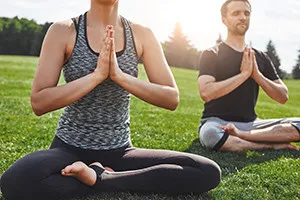
Life 101: Mental and Physical Self-Care 
This course provides students with evidence-based lectures on the importance of mental and physical health and self-care. Through practical methods, students will learn how to adopt a healthy lifestyle and gain the skills to maintain it. Life 101: Mental and Physical Self-Care is designed to inspire and empower students to make positive changes in their lives. ▼
ADVERTISEMENT
Course Feature
![]() Cost:
Cost:
Free
![]() Provider:
Provider:
Coursera
![]() Certificate:
Certificate:
Paid Certification
![]() Language:
Language:
English
![]() Start Date:
Start Date:
29th May, 2023
Course Overview
❗The content presented here is sourced directly from Coursera platform. For comprehensive course details, including enrollment information, simply click on the 'Go to class' link on our website.
Updated in [March 06th, 2023]
This course, Life 101: Mental and Physical Self-Care, is designed to provide students with the knowledge and skills to make healthy lifestyle choices and to promote their mental and physical health. Through evidence-based lectures, multimedia videos, workshops, and group discussions, students will learn about the importance of self-care and how to recognize and manage stress. The course will also provide practical methods to help students adopt a healthy lifestyle and make positive changes in their lives. The goal of this course is to inspire students to make healthy lifestyle choices and to promote their well-being.
[Applications]
The application of this course could include encouraging students to practice self-care activities such as mindfulness, yoga, and meditation. Additionally, students could be encouraged to engage in physical activities, such as walking, running, or biking, to help reduce stress and improve their overall health. Furthermore, students could be encouraged to practice healthy eating habits and to get enough sleep. Finally, students could be encouraged to reach out for help when needed and to build a strong support system.
[Career Paths]
1. Mental Health Counselor: Mental health counselors provide counseling and therapy services to individuals, couples, families, and groups. They help clients identify and address mental health issues, such as depression, anxiety, and substance abuse. Mental health counselors are also trained to provide crisis intervention and to help clients develop coping strategies and problem-solving skills. The demand for mental health counselors is expected to grow significantly in the coming years due to the increasing awareness of mental health issues and the need for more mental health services.
2. Health Educator: Health educators are responsible for educating individuals and communities about health and wellness. They provide information about healthy lifestyle choices, nutrition, physical activity, and disease prevention. Health educators also work to create health promotion programs and campaigns to help individuals and communities make healthier choices. The demand for health educators is expected to increase as more organizations and communities recognize the importance of health education.
3. Wellness Coach: Wellness coaches help individuals develop and maintain healthy lifestyle habits. They provide guidance and support to help clients set and achieve their health and wellness goals. Wellness coaches also help clients identify and address any barriers that may be preventing them from achieving their goals. The demand for wellness coaches is expected to increase as more people become aware of the importance of health and wellness.
4. Stress Management Consultant: Stress management consultants help individuals and organizations identify and manage stress. They provide guidance and support to help clients develop effective stress management strategies. Stress management consultants also work to create stress management programs and campaigns to help individuals and organizations reduce stress levels. The demand for stress management consultants is expected to increase as more organizations and individuals recognize the importance of managing stress.
[Education Paths]
1. Public Health: Public health is a field of study that focuses on the health of populations and communities. It is an interdisciplinary field that combines the sciences, social sciences, and humanities to promote health and prevent disease. Public health professionals work to improve the health of individuals and communities through research, policy, and practice. Developing trends in public health include the use of technology to improve health outcomes, the use of data to inform decision-making, and the use of evidence-based approaches to address health disparities.
2. Psychology: Psychology is the scientific study of the mind and behavior. It is a broad field that encompasses many different areas of study, including cognitive, social, and developmental psychology. Developing trends in psychology include the use of technology to improve mental health outcomes, the use of data to inform decision-making, and the use of evidence-based approaches to address mental health disparities.
3. Nutrition: Nutrition is the science of food and its relationship to health. It is a field of study that focuses on the nutrients in food and how they affect the body. Developing trends in nutrition include the use of technology to improve dietary outcomes, the use of data to inform decision-making, and the use of evidence-based approaches to address nutrition-related health disparities.
4. Exercise Science: Exercise science is the study of the body’s response to physical activity. It is a field of study that focuses on the effects of exercise on the body and how to optimize physical performance. Developing trends in exercise science include the use of technology to improve physical performance, the use of data to inform decision-making, and the use of evidence-based approaches to address physical activity-related health disparities.
Pros & Cons

Interesting and relevant content

Practical and easy to learn

Great instructor

Valuable life advice

Food for thought

Helpful for managing stress

Fun and interesting

Generalizations with little academic support

TEDx talks as content

Errors in quizzes

No discussion forums
Course Provider

Provider Coursera's Stats at AZClass
The Mental and Physical Self-Care course delivers evidence-based lectures that emphasize the significance of both physical and mental well-being, as well as the practice of self-care. Through a practical and interactive approach, students will be equipped with the knowledge and skills necessary to adopt and sustain a healthy lifestyle. The course delves into the importance of prioritizing both physical and mental health, offering insights on stress recognition and management. Students will acquire practical strategies for implementing self-care and cultivating positive habits that contribute to the maintenance of their overall well-being. Additionally, the course incorporates evidence-based lectures and multimedia resources to enhance students' understanding of the subject matter. By the end of the course, students will have a comprehensive understanding of the principles of mental and physical self-care and the tools to incorporate these practices into their daily lives.
Discussion and Reviews
0.0 (Based on 0 reviews)
Explore Similar Online Courses

Free Blender Tutorial - Free Blender 28 Crash Course!

Applied Thermodynamics For Engineers

Python for Informatics: Exploring Information

Social Network Analysis

Introduction to Systematic Review and Meta-Analysis

The Analytics Edge

DCO042 - Python For Informatics

Causal Diagrams: Draw Your Assumptions Before Your Conclusions

Whole genome sequencing of bacterial genomes - tools and applications

Meditation

Mental Health First Aid Skills -

Workplace Mental Health: A Managers Ultimate Guide
 Related Categories
Related Categories
 Popular Providers
Popular Providers
Quiz
 Submitted Sucessfully
Submitted Sucessfully
1. What is the main goal of this course?
2. What type of learning is encouraged in this course?
3. What type of activities are included in this course?
4. Which of the following is one of the main goals of the course Life 101: Mental and Physical Self-Care?


Start your review of Life 101: Mental and Physical Self-Care